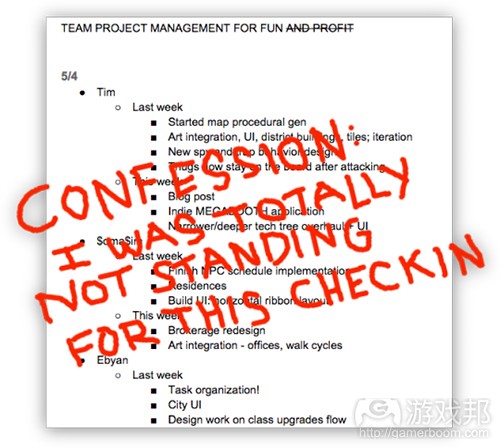对独立开发者有帮助的工具包
作者:Tim Conkling
本文是关于独自工作时所使用的一些工具和技巧。
问题
为了具备生产力,我们必须迎接两个持久的挑战:责任感和专注力。我是独立资助自己的游戏。我是在自己的起居室独自制作游戏。在白天,除了一只猫外这里不会出现其他人。这里也不存在传统的外部问责—-如联合创始人,老板或投资人,所以在这种情况下我很容易懈怠并无所事事。
站立式会议
我总是很懒,并且因为缺少责任结构而没有动力,所以我必须为自己创造一些动力。而“站立式会议”便是我之前曾经工作过的工作室的每日议程。这一过程中有些变量在产业中是非常标准化的,如开发团队在每天早上进行面对面的交谈。每个人都会站着(游戏邦注:因为这能更快速地结束会议)并简短地谈论他们昨天做的事以及计划今天要做的事。当你需要定期向同事汇报自己的工作时,你便很难再出现懈怠的状态或在某项工作上浪费太多时间。
我便使用了谷歌Hangouts,谷歌Docs,并和一些志趣相投并且致力于自己游戏的独立开发者模拟了这种站立式会议。每天早上10点,我便会与Rob Zubek和Ebyan Alvarez-Buylla进行视频聊天。我们会挨个分享自己上周做了什么以及下周要做什么,并谈论一些有关设计和代码的问题,并且我们会努力提供反馈。
我们会将每个参与者记录在谷歌Doc上(我们都可以看到并进行编辑),这意味着这里将有每个人所分享的他们曾经做过的事的参数。如果有人迷失了方向或者效率下降,这都会显示出来,我们也会主动提醒他。
任务追踪
也许每个人都能做到这点,但有时候我却因为缺少管理计划提醒的特定系统而未能有效做到这点。为什么任务追踪如此重要?因为它能够让你更有条理地做事,并且它也提供了另一个层面的责任感。我很讨厌在一周结束时发现自己只完成了预期计划中的部分内容。
团队交流
我们有一些合同工参与了《Antihero》。我们并非身处同一个地方,所以我们使用了Slack进行书面交流。
我们选择了使用Slack替代了电子邮件和IM,以及维基百科和其它群组文档平台。在这里所有信息都是永久保存的,并且它能够用于你的所有设备上,并能够与任何网页应用有效整合在一起,最关键的是,它是免费的。
《炉石传说》
《炉石传说》是另一个免费且高产的工具:如果你安装了它,你就无需为生产力发愁了!
对于这款游戏我有一个问题,就是如果我在iPad上安装了它,我便可能一直玩这款游戏而不工作。而在工作时间玩游戏是不好的,我最好在晚上再玩它。所以我的做法是:每天早上将它从iPad上删除,等到晚上再重新安装它。
沉迷工具
现在你可以摧毁之前提到的任何工具了。我经常因为自己太沉迷于工具而自责,就像“我需要找到合适的文字处理器才能开始写这篇文章。”好的工具能够完善你的开发过程,但是找到一个好的工具绝不等于你创造了一款好游戏。
(本文为游戏邦/gamerboom.com编译,拒绝任何不保留版权的转发,如需转载请联系:游戏邦)
An Indie Developer’s Toolbox
by Tim Conkling
This post is about tools and techniques for working alone and not being completely ineffective.
It’s my third piece on process and project management as an indie developer. I hadn’t planned on gazing quite so intently at my own navel when I began this blog several weeks ago, but: you write what you know, and what I’ve known for the past two years is working at home, alone, on this silly game.
Previously:
Buying a Design Partner – why I’m paying someone to playtest my game.
Design, Doubt, & the Scientific Method – One Weird Trick for dealing with game design anxiety.
The Problem
There are two consistent challenges I have to actively confront in order to be productive: accountability and focus. I’m self-funding my game. I work alone in my living room. There’s nobody else here during the day except for a cat, who’s like the worst role model ever. None of the traditional sources of external accountability – co-workers, bosses, other peoples’ money – are part of my day-to-day, and so it’s dangerously easy to just screw off and do nothing.
Stand-Up Meetings
I am lazy and unmotivated in the absence of accountability structures, and so it’s necessary to create some. “Stand-up meetings” were a staple of daily life at both studios I worked at before going indie. Some variation of this process is pretty standard in the industry: the dev team meets, face-to-face, every morning. Everyone stands to increase the likelihood that the meeting will be quick, and speaks briefly about what they did yesterday and what they’re planning to do today. It’s tough to slack off or spend an unreasonably long time in a rabbit hole when you’re regularly reporting to your peers.
I’m simulating stand-up meetings with Google Hangouts, Google Docs, and a couple like-minded indies who are working on their own games. Every Monday morning at 10am sharp, I get on a video chat with Rob Zubek (1849) and Ebyan Alvarez-Buylla (Crossword Dungeon). We talk, in turn, about what we did last week and what we’re doing this coming week, and about design and code issues we’re struggling with or want feedback on.
The salient bits of a participant’s checkin get recorded in an ever-lengthening Google Doc that we can all see and edit, which means there’s a permanent record of what each person told the group they were going to be working on. If somebody’s lost in the weeds or is otherwise unproductive, it’ll be noticed – and they’ll be called out.
(We use Google Hangouts instead of Skype because the AV quality is better and also because Skype is just a horrible piece of software.)
Task Tracking
Maybe everybody else already does this, but there was a time when I did not have a specific system for managing to-do lists. Here’s why it’s important: it keeps you organized, of course, but it also provides another layer of accountability. I hate getting to the end of a week and seeing that only a few items have moved to my “done” list.
(I use Trello because it’s free, and because the UI is pretty and satisfying to use. I wish I had something smart and insightful to say about it. It works.)
Team Communication
There are several contractors working on Antihero. We’re not in the same physical space, however, so we use Slack for pretty much all written communication.
Slack replaces email and IM – and, to some extent, wikis and other group documentation platforms. All messages are persistent, it works on all your devices, it integrates well with every web app ever, and, again, it’s free. (And it’s made by game developers.)
Hearthstone
Hearthstone is another free productivity tool: if you install it, you’ll be free from productivity! LOLOLlkajsdf.
I have a problem with this game: if it’s installed on my iPad, I will play it and not work. It’s not ok to play during work hours; it is ok to play in the evening. So: every morning I delete it from the iPad, and every night I reinstall, because I am ridiculous.
(There’s always a Hearthstone. Over the course of Antihero’s development, I’ve also had to cut off access to Card Hunter and like half of the web.)
Tools Fetishization
Now to undermine everything that just came before. I’m frequently guilty of tools fetishization – “I need to find the right word processor to start writing this stupid blog,” for example – and it’s a great way to feel like you’re making progress when you’re actually doing nothing. Good tools improve the development process, but finding the right tool is not the same as making a game.(source:gamasutra)
上一篇:教育类电子游戏的兴盛与衰败








































 闽公网安备35020302001549号
闽公网安备35020302001549号